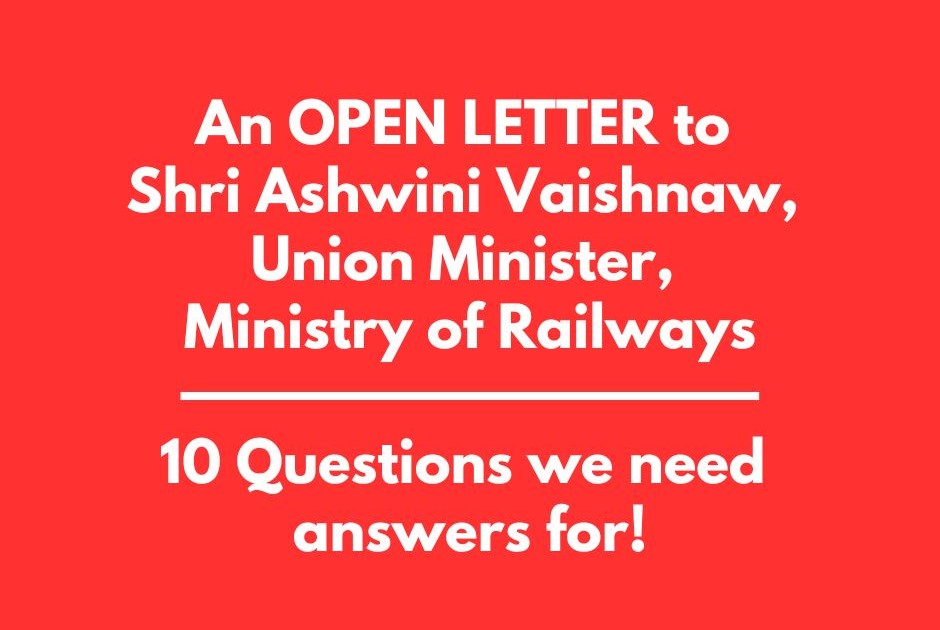To,
Shri Ashwini Vaishnaw
Union Minister, Ministry of Railways,
Rail Bhavan, New Delhi, India
Subject: Fixing Accountability in Ensuring Railway Safety and Removing the Shield of ‘Human Error’ During Tragic Accidents
Dear Sri Vaishnaw,
We expect this letter reaches you when you too as the Railway Minister of India are sharing the shock, and profound public disappointment over the tragic railway accident of Bahanaga in Odisha which has taken lives of close to 300 passengers and left hundreds critically injured and hospitalised.
In this moment of crisis, the moral strength of the entire nation firmly goes with you in deploying and extending all possible resources to support the rescue operations.
We are writing to you today with a heavy heart, deeply saddened by the recent tragic train accident that has once again reminded us of the critical safety challenges faced by the Indian Railways. While accidents are unfortunate, what concerns us more is the repetitive tendency of the ministry to attribute these incidents solely to human errors, without adequately addressing the pressing need for advanced technology and acknowledging its own failure on key safety parameters.
We have truly appreciated your work during your Indian Administrative Services where you served in the Odisha cadre, and worked extensively in different parts of the state including the districts of Balasore and Cuttack. Your hard work during the time of super cyclone 1999 is still remembered where you took many preventive measures and managed to collect data related to real timing and place of cyclone. Ironically, Balasore will also be now remembered as the place where one of the worst train accidents happened in Indian history under your stewardship.
The Indian Railways, being the lifeline of our nation, holds the responsibility of ensuring the safety and well-being of millions of passengers who rely on its services every day. However, the recent incident, along with previous accidents, has exposed the vulnerabilities in our current system and the urgent need for a paradigm shift in our approach to railway safety.
It is disheartening to witness the Ministry consistently resorting to pointing fingers at human errors without taking a comprehensive view of the underlying issues. While human errors certainly contribute to accidents, it is crucial to understand that our railway infrastructure and safety mechanisms should act as safeguards against such errors, ensuring that the consequences remain minimal.
Rather than solely focusing on human errors, I urge the Ministry of Railways to engage in open discussions and provide transparent insights on the need for advanced technology in our railway systems. We must address the persistent failures on key safety parameters, including signalling systems, predictive maintenance, real-time monitoring, and automation, which have been long overdue for significant improvement.
- Why does the Ministry repeatedly attribute accidents to human errors, deflecting attention from the pressing need for advanced technology in our railway systems?
- What concrete steps are being taken to invest in advanced signaling systems that can prevent collisions, over speeding, and unauthorized movements?
- Why is the implementation of predictive maintenance programs not given priority, despite their potential to identify and rectify faults before they escalate into catastrophic accidents?
- How is the Ministry leveraging real-time monitoring and incident response technologies to detect anomalies and ensure rapid interventions during critical situations?
- What initiatives are being undertaken to explore and implement automation technologies that can enhance precision, efficiency, and safety in railway operations, thereby reducing the potential for human errors and fatigue-related accidents? Can you given a trend of railway budget allocation on technology enhancement and safety measures over last 10 years?
- What specific measures were in place to prevent such a shocking incident, and why did they fail to function effectively?
- Has there been a review of the safety protocols and guidelines followed by railway personnel? If yes, what improvements are being implemented to ensure strict adherence to safety protocols?
- Is there any regular external technology audit in place for Indian Railways? If yes, are they being held responsible for the tragic incident? If not, why?
- Is there a comprehensive plan to upgrade the railway infrastructure to meet modern safety standards? If so, what is the timeline for implementation and what specific improvements are being prioritized?
- Are there any plans to collaborate with international experts or organizations to gain insights and best practices in railway safety and implement them in our system?
Additionally, it is crucial for the Ministry to introspect and acknowledge its own failures and shortcomings. It is through accountability and transparency that we can foster a culture of continuous improvement and ensure that the mistakes of the past do not repeat themselves.
We, as concerned citizens, are eager to see the Indian Railways evolve into a world-class, safe, and efficient transportation network. However, this vision can only be realized by prioritizing a technology-first approach, investing in cutting-edge solutions, and fostering a culture that values safety above all else.
We kindly request you to address these questions and concerns raised by us and countless others who share a deep concern for the safety and well-being of passengers. By embracing advanced technology and assuming responsibility for the failures on key safety parameters, we can pave the way for a safer and more reliable Indian Railways.
Thank you for your attention to this matter. We look forward to receiving your response and engaging in a constructive dialogue about the future of our railways.
Yours sincerely,
TheCSRUniverse Team








.jpg)









